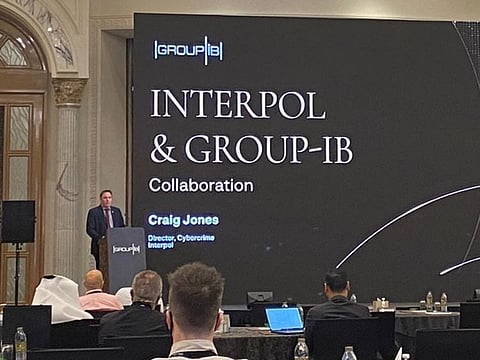Interpol: UAE has useful tools to determine impact of cybercrimes
Group-IB Threat Intelligence and Research Centre launched in Dubai

Dubai: The borderless nature of cybercrimes can make it difficult to track down criminals, Interpol’s director of Cybercrime said in Dubai on Sunday.
With UAE’s setting specialised platforms like E-crime by Dubai Police and having strong digital infrastructure, Craig Jones believes that aggregating data from different countries is the key factor to curb cybercrimes in the region.
Jones told Gulf News in an exclusive interview that phishing and online fraud are main forms of cybercrime in the region. “UAE funds a number of projects at Interpol under the foundation project. Phishing and online fraud is impacting the UAE but I think you need to consider the UAE is very well-developed in the digital context,” Jones said during the launch of Group-IB in the UAE.
Group-IB is a global threat hunting and adversary-centric cyber intelligence company specialising in investigating and preventing hi-tech cybercrimes.
Growth plans
Jones pointed out that Interpol has a number of officers but they want to grow in the region. “We look at the skill sets in this region as well as at the capabilities in the police, but also in the private sector as well. So what we’re looking to do is put all that together effectively to fight cybercrimes,” he added.
He said that as the digital economy expands, cyber criminals get more opportunities to conduct their operations. “What motivates a criminal is greed. They will target different sectors for ransomware attacks but when you look at the set-up in this region [GCC and Middle East], they’ve got a really strong financial sector.” He urged community members to be cautious about phishing emails or links to avoid online fraud and cyberattacks.
Jones praised Dubai Police’s E-Crime platform, saying it is a useful tool to determine the impact of cybercrimes in the UAE. “It is a good tool for the public to use to be able to report their crime data. It also reduces the amount of time it takes to report a crime because previously, you had to go to a police station and spend two hours. Now you can do it in under five minutes,” added Jones.
He said that such platforms will help in bringing the data together effectively. After analysing all the data that goes in there, police will have good picture of the different types of cybercrimes. “If they see some spikes or some trends, that’s when they can then undertake activities like setting awareness campaigns to the public,” said Jones.
How private cybersecurity companies support war against cybercrimes
Craig Jones believe that the threat of cybercrime is global, with regions being impacted differently. With about 194 member countries are under the Interpol’s umbrella, Jones said that work also dovetails with private partners like Group-IB. “We have 12 private partners, of which Group-IB is one. They supported us in crime prevention and to reduce the global impact of cybercrime and protect communities for a safer world,” Jones said.
It helped to understand the threat picture and that collection of data information and turning that into actual intelligence. “We collect from numbers, different data sources, we bring that together in Singapore, and then we share the data and information with the police,” he added.
“It might be around we identify some actors. So then we would bring the countries together, where you might have the infrastructure, we might have the victims, and then we coordinate that to go after the actors.”
He said that private groups are helping with feeding data. “Interpol is connecting country members together as well as private cybersecurity groups to stand against cybercriminals. The new headquarters will play a pivotal role for Group IB’s research into the regional threat landscape and on-the-ground support for their customers and partners,” said Jones.
New centre opens
Meanwhile, Group-IB inaugurated its Middle East and Africa Threat Intelligence and Research Centre in Dubai.
Group-IB’s office would not only operate just as a sales hub but also as a full-scale regional headquarters, offering all core technological competencies and bringing with it the top skills that are found across its global headquarter in Singapore and other offices. “Zero tolerance to cybercriminals has brought us to the forefront of the global fight against online crime,” said Ilya Sachkov, Group-IB CEO and founder.
“Dubai is a perfect place to carry on this mission together with local institutions and international law enforcement. As part of our contribution to building a vibrant cybersecurity ecosystem in the UAE, we plan to develop world-class research, monitoring, incident detection and response capabilities here in Dubai and adapt them to the needs of the market.”
The new Centre, located at the Dubai Internet City, will accommodate employees from key Group-IB units: hi-tech crime investigations, Digital Forensics and Incident Response lab, Threat Intelligence, security assessment, Computer Emergency Response Team, Threat and Fraud Hunting teams, Digital Risk Protection department, and other major divisions.
Group-IB CTO Dmitry Volkov said that ransomware attacks and sale of access to corporate networks are regional cyber trends.
According to Group-IB’s data, at least 12 victims suffered from publicly known ransomware attacks in the Middle East in 2020, with most of them having taken place in the UAE.






